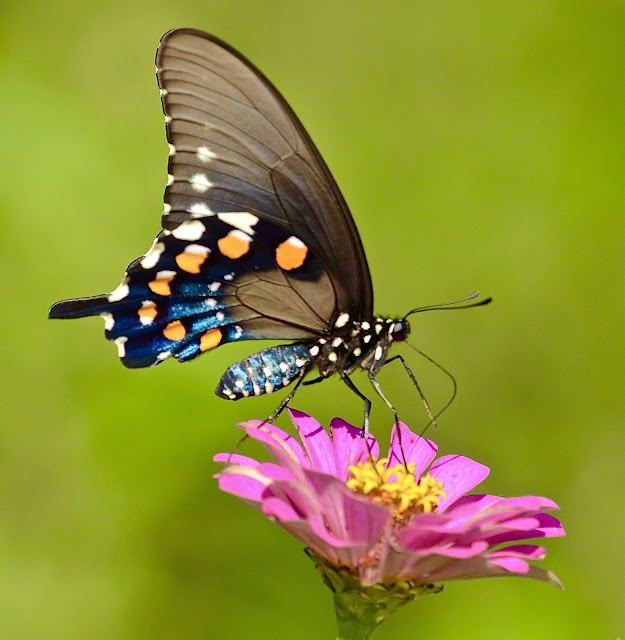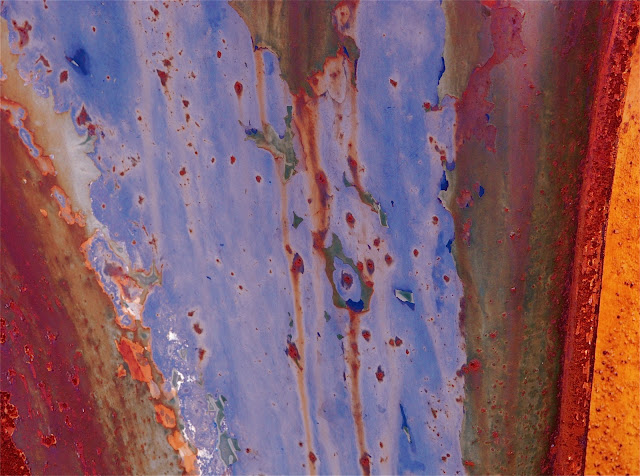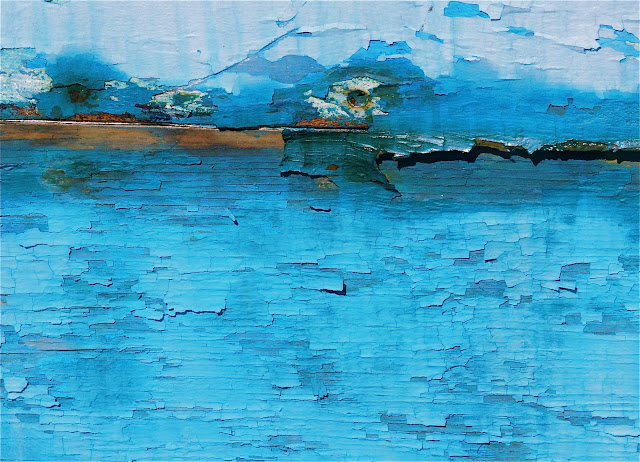Inspired by recent postings of several other bloggers, including my friend, Ruth, author of Synch-ro-ni-zing, I have decided to pull back the curtain on the study in which I read, write, and ponder questions that will never be answered. In the spirit of full disclosure, however, I must confess that that these photos—taken on the morning of my departure for a few months in South Carolina— suggest a level of neatness that is rarely found in my little sanctuary. On most days, the study is cluttered with books on the floor, mail and periodicals on the desk, an myriad other items that a more organized person would have disposed of promptly and properly (e.g., abandoned coffee cups, opened maps, computer cables I don't understand, and shoes taken off the night before).
My study (header photo) is a converted bedroom that is furnished with a few of my paintings, a photo of my first yellow lab ("Baci"), three bookcases, and the desk and credenza that are holdovers from my days of practicing law.
Other than books, furniture, and computer equipment, I do not keep many objects in my study. On these bookshelves, however, you can see a few objects that I value for spiritual reasons. On the middle shelf is a hand-thrown begging bowl (made by a potter friend), which is a daily reminder of how little one actually needs to live; a scallop shell (symbol of the Camino de Santiago de Compostela), which is a reminder that every day and every step is part of a pilrimage; and small carved statue of Buddha, which is a reminder that I can always choose peace.
Beneath the shelves is a beautiful stone with a single word carved into its center: "Create." Few words in my vocabulary hold as much power and possibility as this word.

I have finally abandoned the the idea that I can retain all of my favorite books in my house. Many are in storage and I am finally becoming more comfortable with the idea of donating books to the local library unless there is some reason for not doing so. What remains in my study are those volumes which invite me to return to their pages frequently—poetry, a few favorite novels, art books, travel books, and a variety of books relating to philosophy, theology, and ancient wisdom traditions.
For the most part, my books are not organized according to author, subject matter, or any other standard. On this shelf, however, are treasured volumes of two of my favorite authors, Henry Miller and Thomas Merton. This is the default shelf when I find myself teetering toward despair. Any volume on this shelf is likely to clear my vision and lift my spirits.
As you can see from this shelf, my reading habits are very eclectic. Lots of books on religious and spiritual traditions—Buddhism, Zen, Taoism, Hinduism, and the origins of Christianity. I see some volumes by Wendell Berry, Annie Dillard, and Annie Lamott, all of whom I admire. Others on this shelf are are Krishnamurti, Dante, Emerson, and the poet Stanley Kunitz. Just in front of the small replica of a bicycle I once owned is my tattered but treasured copy of the great Kazantzakis novel, Zorba the Greek.

This shelf has a bit of almost everything—more Henry Miller, an anthology of the poetry of Jorge Luis Borges, several volumes on yoga, a two-volume anthology of American poetry, the collected works of Yeats, more works by Wendell Berry, a selection Nietzsche's works, and several books on the art of writing. I also see my copy of Jon Kabat-Zinn's fine book, Full Catastrophe Living. I'm especially fond of this title because it reminds me of one of the main reasons I have always loved books: They prepare us for the full measure of life, including all of the catastrophes that will be encountered by each of us.

I'm hopelessly addicted to travel books and travel essays, some of which are found on the top shelf here. I also see a favorite book by Ken Wilber, a compassionate philosopher whom I greatly admire; several works by Rilke, including Letters to a Young Poet, a small volume which I read at least once every year; and one of my books by Karen Armstrong, a contemporary theologian who has written a number of fine books, including a biography of Buddha.
Looking closer at the bookshelves in the second photo of this post, one can see that I have a rather insatiable interest in various wisdom traditions. Underpinning this interest is a lifelong desire to understand the common threads that are found in all of these traditions.
On this shelf is a novel, The Sea, by John Banville, a fine Irish novelist whom I have only discovered in the past few years. There is also a copy of Crossing to Safety, a novel by the late Wallace Stegner, whose work I also greatly admire. Between these novels are several spiritual books, including the Tao Te Ching and more Krishnamurti. I also see a couple of French books—additional evidence of my being an unabashed Francophile.
For what I consider to be enlightened discussions of Christianity, I usually turn to iconoclasts such as some of those represented on this shelf—Paul Tillich, Meister Eckhart, and John Shelby Spong. I also greatly admire the work of Eckhart Tolle, who, like Aldus Huxley in The Perennial Philosophy, has done much to elucidate the core principles that underpin all of the great religions and spiritual traditions. I'm especially fond of Eckhart Tolle's book, A New Earth.
Some of my Alan Watts books are found on this shelf. The writings of Watts were instrumental in introducing me to Zen several decades ago. Also found on this shelf are several different translations of the meditations of Marcus Aurelius, as well as a volume of the Upanishads and some additional works by Krishnamurti.
Well, there you have it—a few glimpses into my sanctuary, one of the places where I can usually find refuge from the outside world and passage into the interior realm. For those who might have the inclination, I would recommend this little exercise, not only because it is always interesting to see the contents of other people's bookshelves, but also because one can discover so much about oneself my simply looking at the favorite books of one's life. A bookshelf is a better mirror of oneself that a piece of glass.












































